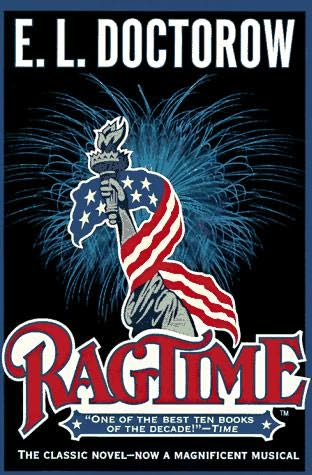 The plot of Ragtime is not easy to define but I'll try: The time is the first decade of the 20th century. The main characters are two families living in the greater New York area, a middle-class Protestant family (Father, Mother, Son, Mother's Younger Brother) in the suburb of New Rochelle, and a poor Jewish family (Tateh, Mameh, and Little Girl, yes, these are their only freaking names). Other characters include Sarah, the black girl who comes to live with the Protestant family with her child for some reason, her lover the ragtime pianist Coalhouse Walker, and various real people from this time, including Houdini, Freud, Emma Goldman, and J.P. Morgan. Several real stories are woven throughout the narrative, all of which connect in some tangential way to the tales of these two families which don't come together properly until the book's end.
The plot of Ragtime is not easy to define but I'll try: The time is the first decade of the 20th century. The main characters are two families living in the greater New York area, a middle-class Protestant family (Father, Mother, Son, Mother's Younger Brother) in the suburb of New Rochelle, and a poor Jewish family (Tateh, Mameh, and Little Girl, yes, these are their only freaking names). Other characters include Sarah, the black girl who comes to live with the Protestant family with her child for some reason, her lover the ragtime pianist Coalhouse Walker, and various real people from this time, including Houdini, Freud, Emma Goldman, and J.P. Morgan. Several real stories are woven throughout the narrative, all of which connect in some tangential way to the tales of these two families which don't come together properly until the book's end.The plot's pretty impressive in its complexity, but the style almost drove me crazy. Perhaps in an imitation of the musical manner of ragtime, the whole thing is written in short, choppy sentences and includes no direct dialogue. This, when combined with the nameless characters, creates a feeling of distance that made it difficult to really care about what happens. If you ever wonder why English teachers tell you to "show, and not tell," this is why: endless repetitions of phrasing like "Father felt this way" or "Father felt that way," no matter how poetic, is super-boring.
To be honest, for the first two sections of this book, I was bored out of my mind. It picks up quite a bit in the second half, which skips around less and deals mostly with the story of Coalhouse Walker, the book's single interesting character: Coalhouse is somewhat of an oddity as a black man who dresses nicely and owns a Model T, and for this he is picked out for harassment by the local Fire Chief, who stops his car outside the fire station and tells him that he's driving on a toll road. Coalhouse is too proud to pay off the Fire Chief, so he leaves the car, which has been barricaded, and tries to find a policeman, but when he comes back without help he finds that the car has been vandalized and defecated in. Coalhouse wants to sue, or press charges, but can't seem to find anyone to represent him. Sarah, in a moment of foolishness, tries to get the attention of the Vice President (who she thinks is the President) to solve the problem on a campaign stop nearby, but after the assassination of McKinley the secret service is anxious and violently stops her from approaching him, and she dies. Enraged, Coalhouse goes on a terroristic rampage, blowing up the fire station and causing general mayhem for months, demanding that his car be restored and the Fire Chief turned over to his justice.
So, that's pretty cool. But the rest of this book is weighed down by really irritating prose and boring shit. In its clear attempt to be "The Great American Novel," Ragtime often comes off like a dry history lesson and not like a compelling work of fiction.

No comments:
Post a Comment